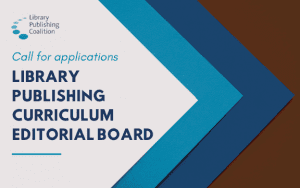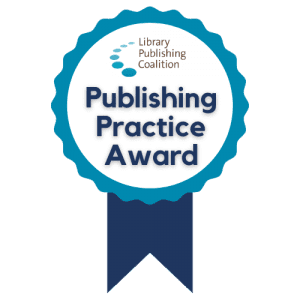March 13, 2023
By Nancy Adams
 The Library Publishing Coalition Board seeks applications for the Library Publishing Curriculum Editorial Board. Created in partnership with the Educopia Institute as part of a project generously funded by the Institute of Museum and Library Services, the Library Publishing Curriculum is an ongoing program of the LPC. The Editorial Board identifies maintenance and development needs for the Curriculum, oversees (and occasionally performs) that work, and promotes the wide adoption and use of the Curriculum. The Editorial Board functions on a cohort model, with all volunteer terms starting at the same time (July 1, 2023) and running for three years. Leadership for the group is provided by the Editor-in-Chief (a three-year dedicated position) and the group chair (an annual, rotating position held by an Editorial Board member).
The Library Publishing Coalition Board seeks applications for the Library Publishing Curriculum Editorial Board. Created in partnership with the Educopia Institute as part of a project generously funded by the Institute of Museum and Library Services, the Library Publishing Curriculum is an ongoing program of the LPC. The Editorial Board identifies maintenance and development needs for the Curriculum, oversees (and occasionally performs) that work, and promotes the wide adoption and use of the Curriculum. The Editorial Board functions on a cohort model, with all volunteer terms starting at the same time (July 1, 2023) and running for three years. Leadership for the group is provided by the Editor-in-Chief (a three-year dedicated position) and the group chair (an annual, rotating position held by an Editorial Board member).
We are currently recruiting for 4 regular members (who will join 5 members from the previous cohort who opted into a second term) and the Editor-in-Chief. All interested volunteers should apply to serve on the Editorial Board. Those who are interested in the Editor-in-Chief position can complete an additional application step to be considered for the role. Those who are interested in serving as Editorial Board chair at some point during their three-year term will have an opportunity to indicate their interest.
Membership Qualifications and Term Lengths
Highly desired qualifications include:
- Accomplishment and expertise in library publishing
- Research/publishing experience
- Experience with curriculum development
- Strong commitment to diversity, equity, inclusion, and accessibility
It is not necessary for candidates to possess robust experience in all the above areas, but they should be able to demonstrate experience with at least one or two. While service on most LPC working groups is limited to staff at member institutions, a limited number of editorial board spots will be open to non-members. All interested individuals are encouraged to apply.
Members will serve three-year terms, which can be renewed once. Members who want to serve more than two consecutive terms must reapply. Estimated time commitment will be 5–6 hours a month, unless a member decides to take on additional writing/revision responsibilities.
Editorial Board Responsibilities
Identifying work needed: The editorial board will be responsible for identifying gaps and opportunities in the curriculum, including new units, updates or adaptations of existing units (e.g., adapting the copyright unit for another country’s copyright landscape), translations, and other projects that will increase the currency, utility, and breadth of the curriculum.
Recruiting and guiding project participants: The editorial board will recruit project participants and guide them through their project work; these individuals would work with the editorial board to devise and implement major revisions or additions to the curriculum.
Authoring/updating curriculum content: For small projects, the editorial board may decide to undertake the work itself, rather than recruiting project participants.
Identifying resources for curriculum development: For projects the editorial board wants to undertake that will require outside funding or other resources, the group will work with the EIC and LPC’s Board to identify potential funding sources and apply for grants.
Ensuring high quality content: The editorial board will ensure that existing content is still useful and relevant, and that new content developed meets project goals and quality expectations.
Curriculum promotion: The editorial board is responsible for promoting new and revised content, and encouraging adoption of the curriculum in a variety of settings.
Editor-in-Chief Responsibilities
The Editor-in-Chief (EiC) provides leadership to the Editorial Board in the areas above. This role will provide continuity for Editorial Board leadership and will serve as the public face and point of contact for the Curriculum. The EiC will work closely with the Editorial Board chair to lead the group but will especially focus on strategy and vision for the Curriculum.
Editorial Board Chair Responsibilities
The chair will work closely with the Editor-in-Chief to provide leadership for the Editorial Board, focusing especially on facilitation of the group and implementation of plans. The chair role will rotate annually among Editorial Board members.
Application Process
To apply to serve on the Editorial Board, please fill out the volunteer application by Friday, May 26th. LPC’s Board will review candidates at its June meeting and select the new members, who will start July 1st, 2023.
 The Publishing Practice Awards are designed to recognize and raise awareness of effective and sustainable library publishing practices. They highlight library publishing programs that exemplify concepts advanced in LPC’s An Ethical Framework for Library Publishing and in LPC’s Values. The focus of these awards is not on a representative publication’s content but, rather, on the process of publishing. The award categories for 2023 are Accessibility, Diversity, Equity, and Inclusion, Privacy, and Innovation.
The Publishing Practice Awards are designed to recognize and raise awareness of effective and sustainable library publishing practices. They highlight library publishing programs that exemplify concepts advanced in LPC’s An Ethical Framework for Library Publishing and in LPC’s Values. The focus of these awards is not on a representative publication’s content but, rather, on the process of publishing. The award categories for 2023 are Accessibility, Diversity, Equity, and Inclusion, Privacy, and Innovation. 
 The Library Publishing Coalition Board seeks applications for the
The Library Publishing Coalition Board seeks applications for the 
 “My name is Jeremy Ottley. I’ve spent my career working in academic publishing, often on the digital side. I’ve always had a strong interest in the intersection between technology and publishing. I’ve collaborated with libraries, and other campus partners, to produce books, journals, and custom course materials.
“My name is Jeremy Ottley. I’ve spent my career working in academic publishing, often on the digital side. I’ve always had a strong interest in the intersection between technology and publishing. I’ve collaborated with libraries, and other campus partners, to produce books, journals, and custom course materials.